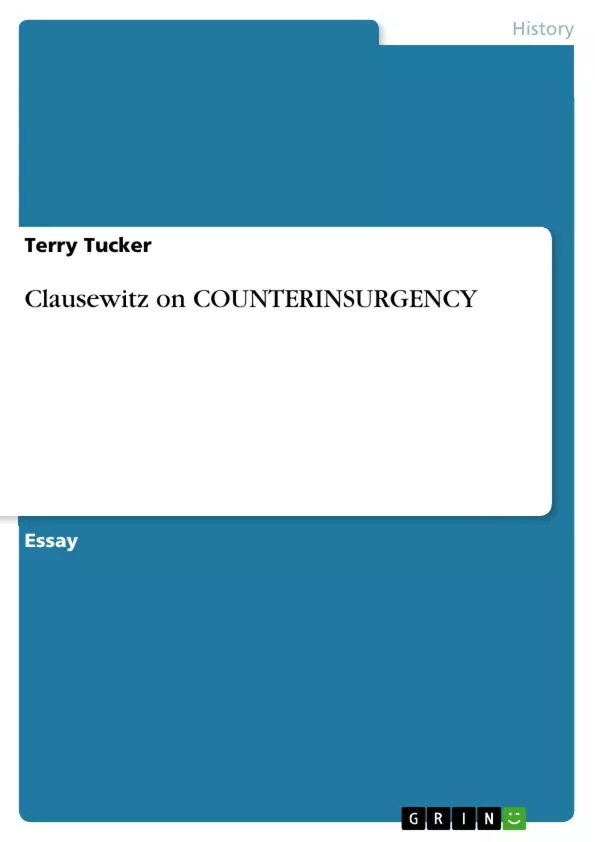Contemporary counterinsurgency doctrine essentially describes counterinsurgency as an inherently political and cultural contest for the trust of the population and an inherent principle in this contest is the primacy of legitimate government: essentially politics has primacy and in counterinsurgency, “all politics is local.”
Clausewitz said that “the ideal of a logically complete or sufficient answer to any problem in warfare is sheer delusion”. Many would ask how a book written over 150 years ago would be relevant today and worth the time in a counterinsurgency.
Inhaltsverzeichnis (Table of Contents)
- Clausewitz on Counterinsurgency
- From a Conventional Point of View
- War is a Social Phenomenon
- The Master Himself Lays Out Rules for Learning
- The Nature of War, to Which Counterinsurgency is Also a Type
- Interpretations and Theory of On War Has Been Said to Emphasize the Primacy of Policy in the Conduct of War
- Tactical Considerations with Far Reaching Strategic Impact
Zielsetzung und Themenschwerpunkte (Objectives and Key Themes)
This text aims to explore the relevance of Clausewitz's ideas on war to contemporary counterinsurgency doctrine. It examines how his concepts of the political nature of war, the need for adaptability and flexibility, and the importance of understanding the social context of conflict, apply to modern counterinsurgency operations.
- The political nature of war and its relevance to counterinsurgency
- The importance of flexibility and adaptability in counterinsurgency
- The social and cultural dimensions of counterinsurgency
- The role of historical context in understanding counterinsurgency
- The relationship between doctrine and practice in counterinsurgency
Zusammenfassung der Kapitel (Chapter Summaries)
- The first chapter establishes the central argument that Clausewitz's work on war is relevant to modern counterinsurgency doctrine. It introduces the concept of counterinsurgency as a political and cultural contest for the trust of the population and highlights the importance of legitimate government in this context.
- The second chapter examines Clausewitz's view that war is inherently political and that its purpose is to achieve a political objective. It discusses how this concept applies to counterinsurgency, where achieving political goals is essential to success.
- The third chapter explores Clausewitz's idea that war is a social phenomenon rather than just a technical one. It argues that counterinsurgency operations require an understanding of the social and cultural context in which they are conducted.
- The fourth chapter delves into Clausewitz's approach to learning from history and its relevance to counterinsurgency. It discusses the importance of careful analysis, considering multiple causes and effects, and recognizing the limitations of applying historical lessons to contemporary conflicts.
- The fifth chapter examines Clausewitz's concept of the "theory of war" and how it applies to counterinsurgency. It argues that counterinsurgency doctrine should be a foundation for thinking about counterinsurgency rather than a prescriptive or descriptive approach.
- The sixth chapter explores Clausewitz's ideas about the relationship between government and people in wartime and how they relate to counterinsurgency. It highlights the importance of understanding the dynamics of conflict, recognizing that effects can have multiple causes, and considering the limitations of war itself.
- The final chapter discusses the need to understand the local context of conflict and the importance of developing local solutions to local problems in counterinsurgency. It emphasizes that no broad scalable or replicable template exists for counterinsurgency, but that doctrinal principles provide a valuable framework for understanding the general context.
Schlüsselwörter (Keywords)
This text focuses on the key concepts of counterinsurgency, political warfare, social phenomena, adaptability, flexibility, historical context, doctrine, and the relationship between government and people during conflict.
Frequently Asked Questions
How is Clausewitz's work relevant to modern counterinsurgency?
Clausewitz's work remains relevant because he viewed war as an inherently political act. Modern counterinsurgency doctrine mirrors this by treating conflict as a political and cultural contest for the trust of the population rather than just a military problem.
What did Clausewitz mean by the "primacy of policy"?
He argued that war is a continuation of politics by other means. In counterinsurgency, this means that every tactical action must serve a broader political objective to achieve lasting success.
Why is the social context of war important in counterinsurgency?
Clausewitz viewed war as a social phenomenon. Counterinsurgency requires a deep understanding of the local culture, social dynamics, and the relationship between the government and the people to be effective.
Is there a standard template for successful counterinsurgency?
No. The text emphasizes that there is no scalable or replicable template. Instead, Clausewitzian theory suggests that doctrine should be a foundation for flexible thinking tailored to local problems.
What is the "ideal answer" in warfare according to Clausewitz?
Clausewitz stated that a logically complete or sufficient answer to any problem in warfare is "sheer delusion," highlighting the complexity and unpredictability of conflict.
- Quote paper
- Professor of History Terry Tucker (Author), 2011, Clausewitz on COUNTERINSURGENCY , Munich, GRIN Verlag, https://www.grin.com/document/165134



